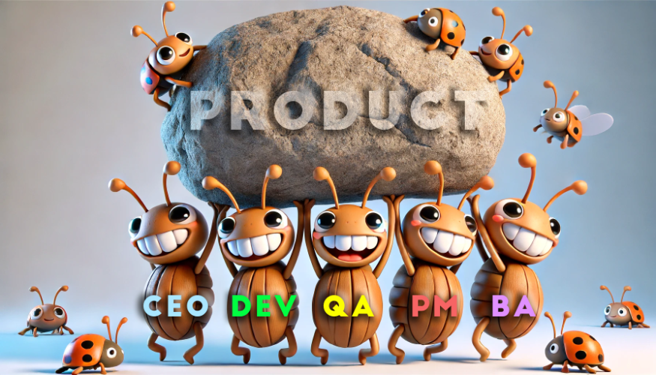Happy Developers. It is Possible
February 11, 2024 •

There are a lot of unhappy developers and this shouldn't be the case. These are the strategies I use to foster a happy and productive developer team.
Differentiate between urgent vs. important
The human mind is reactive by nature. We often react quickly without thinking whether what we did was the best thing to do. Understanding the difference between urgent and vital is beneficial for all those involved. An urgent task has clear deadlines and consequences if acted on after past the specified time, whereas essential activities lack a limited timeframe, meaning you can delay them. If everything is urgent, then nothing is vital. Putting out too many fires doesn't promote the developer’s happiness. It can result in burnout and lower output. Use urgency scarcely and only when it makes sense. You can handle this harmoniously with your developers using Goleko. It will aid in sorting out tasks, improving communication, and categorizing vital tasks. Try Goleko to enhance your work experience.
Never confuse bugs and features
Most developers want to create features, solve problems, and have fun. The line can sometimes be blurred between bugs and features. A developer can put their time into a feature to improve the software only for the managers to classify it as a bug.
A feature is intentional, while a bug is accidental. Understanding the distinctions is crucial and why reporting the bugs well is important. Developers dislike spending days on pseudo-bugs. They take it personally when their creative addition is dismissed as a bug. Correctly discern between the two, figuring out a bug and a feature. 
Report bugs well
Ineffectively reporting bugs reduces the probability of them getting rectified. It’s vital to give specific feedback to your developers. Your bug report should have all the key points or relevant information about the particular struggle. It allows the developer to visualize the problem in the best way possible. Visual proof through screenshots and video clips can also help here. Tell them what you expected to happen and what ended up happening. Use the right tone when delivering the feedback. Don’t use harsh words or abusive language, assuming the developer made an error. It's better to use a suggesting tone to maintain morale.
Here is a guide on how to report bugs.
Table 
Summarize conversations with bulleted lists
It helps to use bullet points when speaking with your developer team. Bullet-pointed lists help get your intent across in the most concise way possible. Here is an example:
- The most important is to make it possible for the admins to upload pictures
- After this, the focus can be on showing the pictures
- If there are problems with admin rights, contact Monica for access
Respect their individuality
We are unique individuals. Part of maintaining morale in your projects is recognizing the different personality types of software developers. Expect your developers to have a wide range of character traits. Here are the typical best personality types for coders:
- INTJ (introverted, intuitive, thinking, judging)
- ENTP (extroverted, intuitive, thinking, perceiving
- INTP (introverted, intuitive, thinking, perceiving
- ENFP (extraversion, intuition, feeling, perceiving)
- ISTJ (introverted, sensing, thinking, judging)
Ask what is up
Nurture a relationship with your developers. Ask how they're feeling aside from work. Feel free to break the ice by discovering their hobbies and favorite sports or cracking a few jokes. Programmers are regular people. Building rapport allows your developers to communicate new ideas more freely and whether something is affecting their work
Let them optimize and tinker
Programmers are passionate about coding and love to enhance their developer tools. This isn't to say they should always experiment, but dedicating a day to this can be good. Tinkering has a lot of positive impacts. It sparks their creativity allowing them to come up with better ways to handle tasks or better optimize existing task procedures.
Developers get inspired to enhance their knowledge and skills continuously. Optimization and tinkering are good to enhance the knowledge and creativity of your developers and enhance the entire development process.
Invest in proper tooling
Having the right tools for the job can make or break a project. Despite this, proper tooling doesn't always have to be pricey. The most crucial factor is the usefulness and necessity for the intended product's success. Integration is related to this as well. Some tools merge quite nicely with existing tools. Providing your developers with a better PC or laptop and an additional monitor may make a difference in the efficiency of tasks getting done. Existing developer experience can determine a tool's usefulness for a project. Programmers have strong opinions on stuff they've already used and can express these freely. New and exciting tools will empower your developers and add to their industry knowledge. Some tools may take more time and effort to deploy in a team and integrate with existing software. Here is a list of the key tools that are necessary for keeping your developers happy:
- IDE (Integrated Debugging Environment)
- Build tools
- Source control
- Bug trackers
- Profilers
- Automated deployment/continuous integration tools
- Testing tools
- Noise-cancellation headphones
- An extra screen
- Better computer
- Aid, not dictate
Developers are generally logical beings. They are happier when they know how a process aids their work. Each process should be relevant. Why something has to be done a certain way should make sense. It's easy to copy and implement processes done by another organization into your team. This doesn't mean your developers will be happy about it. Let the developers help create their processes; they are here to code and not worry about the procedure. They are knowledgeable about the best strategy for software creation.
Prioritize with conversation
Developer teams worth their salt are generally busy. Using the right conversation strategy with them is vital to get a word in. Developers are highly technical, making a direct approach best. An excellent method is to evaluate what to do with them in collaboration. Maximizing the value of each task should be the priority. Developers are more accommodating when respected and appreciated for their time and effort. Sometimes, the simplest thing is not that simple, while something that seems complicated may take a few minutes. Everything requires time and effort to fulfill. Appreciate the work your developers do and give them the respect they deserve. Read 7 Tips for Effective Communication in Remote Teams for more communication tips.
Provide growth opportunities
No one wishes to stagnate in life. Offering growth opportunities is essential for companies that train software developers. It's a common trend that most employees, particularly developers, don't stay in one organization for 2-3 years. This is because they see their friends moving up the ladder, which propels them to search elsewhere. Companies can encourage room for growth through learning and project participation as alternatives to promotion. This will better equip them in their career and convince them to stay in your organization. This, combined with support from the organization, ensures continuous growth opportunities.
Conclusion
Compensation entices developers, but keeping them happy is a whole different story. Brilliant developers are 'rare finds', with new opportunities often knocking on their doors. That's why you should know how to keep them committed to you with the tips we've shared above. We have other helpful tips to help you manage a remote team of workers and freelancers. Read Principles for Managing Remote Teams and Freelancers to gain great insights on managing such teams.
FAQs
How can you improve a developer's productivity?
Developers can work fast toward specific goals. Engage them and create a productive culture that promotes their creativity and freedom. This will make them highly productive and secure in their roles. Give them an environment that promotes professionalism and enhances their production.
How can developers work together?
Developers are consummate professionals. They study their craft and respect their peers. They prioritize their work and build great products. You can form a good community with your developers to enhance their workflow. Keep them updated on their progress and encourage them in their tasks. Help them learn to work together and you'll see faster results.
How can software engineers be innovative?
Software engineers can practice their craft to grow their innovation. This process can frustrate them but it is important to ensure they don't become unproductive. They can easily get stuck in a loop if they go off-script. Keep them focused on the script and they'll build great software for your organization.
How can you make software development competitive?
You can make it competitive by studying the metrics. Analyze your output at specific rates either per week or per month. Pick specific groups of developers to work on specific projects. Give them the freedom to implement their ideas and work on their tasks. Give them timely comments on their projects and minimize work interruption. This should put you in a position to make your software development competitive.
How can you develop a software application beautifully?
There's no single process that helps you build software beautifully. The principle is about finding something that affects users. You can then create solutions that make users happy. You'll then reap the dividends of your work. Beautiful software is appreciated by the community and by the developers as well.
How can you enhance customer satisfaction?
Customers are right at the end of the day. It's vital to accept their critiques and requests. Write on their community forums to get an idea of what they want. You can then use this data to build software that caters to their needs. This will improve their experience and give you happy developers.
How do developers do their best work?
Developers do their best work when they are in the zone. They see things clearly in this state and focus on their work. You can keep this flowing by keeping them happy. Give them a conducive environment, and provide them with good equipment, and the space to work their magic. Happy developers are productive developers. Enable them to do their best and they'll not fail you.


